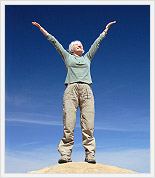|
|
Exercise & Aging
QUESTION:
I've heard that as we age, our fitness level decreases. Is this true? If so, am I simply fighting an uphill battle that I'll lose anyway?
ANSWER:
 As we age beyond 30 years old, we lose cardiorespiratory fitness and muscular strength. This means that we have a decreased capacity for prolonged exercise (such as jogging, swimming or cycling) and intense exercise (such as lifting or throwing heavy objects). The real question is not whether our exercise capacity decreases as we age, but whether there is a way to minimize this deterioration? The clear answer is YES. As we age beyond 30 years old, we lose cardiorespiratory fitness and muscular strength. This means that we have a decreased capacity for prolonged exercise (such as jogging, swimming or cycling) and intense exercise (such as lifting or throwing heavy objects). The real question is not whether our exercise capacity decreases as we age, but whether there is a way to minimize this deterioration? The clear answer is YES.
The problem with aging and exercise is that it is hard to separate the effects of aging from the effects of decreased daily physical activity. The sad truth for most adults is that as we age, even beginning in our teenage years, we become less and less active. Therefore, aging is often also about inactivity, poor nutrition, increased emotional stress, and for some, depression. It is important to factor out all of these additional complications before we can see the sole influence of aging on human exercise physiology.
So what does research tell us about exercise and aging? For the average U.S. adult, maximal capacity for oxygen consumption during exercise decreases by about 1.5% per year beyond the age of 30. Remember, the typical U.S. adult is sedentary and overweight and this rate of deterioration is a complex mix of aging and all the other factors mentioned above.
The good news is that the influence of aging alone has a much lower rate of decline. As best as we can tell, research involving Masters level athletes (individuals who complete quality exercise training and compete beyond the ages of 50, 60 and even 70 years) can reduce the rate of decline in their cardiorespiratory fitness from 1.5 to 0.6 % per year. Thus, remaining physically active by pursuing quality exercise training can cut the societal norm for age-related declines in exercise capacities by 60%! Although the research is not clear, we can assume that the same benefits apply to muscular strength and power.
The other good news is that you do not have to be a gifted athlete to experience these age-defying benefits. Nor do you need to be an ex-athlete who has extended his or her training into later years. Aging does not diminish our ability to adapt to exercise stress. Even older adults can benefit from exercise and experience the gains in functional capacities and the increased quality of life that ensues.
When it comes to aging, exercise is the magic pill that so many people are looking for -- and it doesn't cost a thing! Exercise just requires an investment of time and effort. Given the health benefits of an exercise-trained body, and the probable lowering of health care bills through the rest of our lives, a regular exercise regimen is also an important component of financial retirement plan.

Related Articles:
|
 |
 |
Our expert, Dr. Sharon E. Griffin, holds a B.S., M.S., and Ph.D. in the areas of exercise science/physiology. She also holds a second M.S. degree in Nutrition and is a licensed nutritionist and an ACSM certified health and fitness instructor.
|

